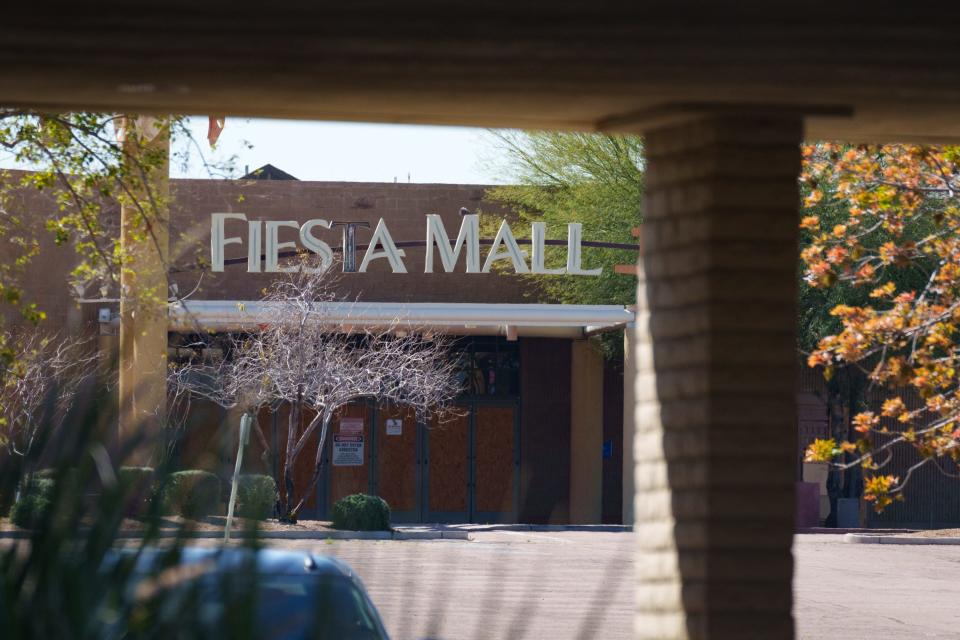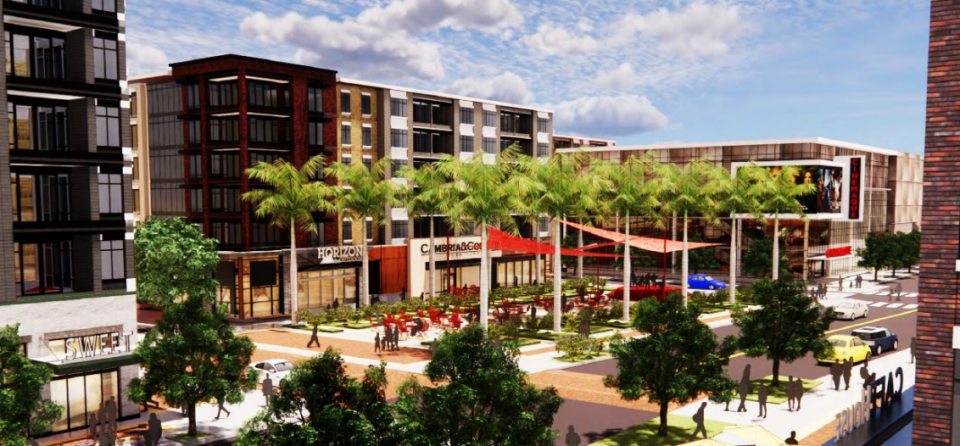From Los Arcos to Paradise Valley to Metrocenter, Phoenix- area mall sites are making a comeback
Metro Phoenix is in the midst of a mall renaissance.
Shopping malls were once a main venue for entertainment, attracting shoppers into large department stores, catering to a wide variety of people eating in the food court and boasting other offerings, like skate parks, movie theaters and arcades.
However, as shopping habits changed, many malls fell from their former status as a main gathering place, and many across the Valley faced the wrecking ball to make way for new development.
While many have shuttered, some have stood up to the changing retail environment. Others have even thrived.
“The classic mall, the enclosed, two-level, air-conditioned mall has changed,” David Uhles, senior vice president of Western Retail Advisors, said. “Shopping behaviors have changed and the demand for experiences has shifted.”
In most markets, Uhles said, a few high-caliber malls can stand the test of time. Those malls, which often include high-end stores, can generally afford the high operating costs that come with such a large retail footprint.
For other malls, which were anchored by lower-end department stores, shifts to online shopping and other changes proved too much to handle. Mall staples, like Sears or JCPenney, have closed hundreds of stores in the past few years, leaving many shopping centers with large, empty stores and nothing to fill them.
When a major anchor closes, Uhles said mall owners often are left with few options, but some of the most successful mall operators have embraced new uses or attract new-to-market offerings. The closing of Chandler Fashion Center’s Nordstrom location could have created a major problem, he said. However, the space was taken by sporting goods store Scheels, which will open its only Arizona location at the mall. Other uses of former anchor stores have included gyms or entertainment venues.
Across the Valley, former malls are part of some of the largest redevelopment efforts, making way for business hubs, medical corridors, attainable housing neighborhoods and more.
Malls that are no more
Some malls across the Valley already have closed, and the space they once occupied will get new life. Often, the redevelopment plans are heavily focused on apartments.
Los Arcos: The former Los Arcos Mall in south Scottsdale was an enclosed shopping mall that was open for about 30 years before its demolition in 2000. The site was pitched as a location for the Coyotes arena, but the team ultimately went to Glendale. In 2005, Arizona State University and the city of Scottsdale agreed to partner on the site, which would eventually develop into SkySong, a mixed-use development that is primarily offices, but includes a hotel, apartments, restaurants and common areas where events are held. Plaza Cos. and Holualoa Cos., the co-developers of SkySong, later partnered again on the redevelopment of Park Central Mall.

Tri-City: Tri-City Mall in Mesa closed in 1998 and was completely demolished in 2006. Portions of the former mall made way for the light rail, which runs along Main Street. Tri-City Pavilions, a strip retail center anchored by a Safeway, was built in its place.
Park Central Mall: Unlike other former malls, Park Central’s buildings were repurposed and reused, not demolished. Most department stores were repurposed as offices, but other uses have also taken some of the space, including EOS Fitness, which will open a location in a former department store. Much of the parking lot space at Park Central has new uses, including Creighton University’s medical campus and an apartment complex. Still to come is a hotel and room for additional buildings. Park Central and the area around it was recently designated as a bioscience hub, the "Phoenix Medical Quarter, Global Advancement of Health and Education."
Metrocenter: Once the largest indoor mall in the Southwest, Metrocenter is scheduled to meet the wrecking ball soon, after a group of developers bought it and have planned to develop a mixed-use development oriented toward housing. The project will include more than 2,600 apartment units, 150,000 square feet of commercial space, and a parking garage. The apartments will be “attainably priced,” but rents are not yet determined. Housing will offer both rentals and for-sale options. Other elements will include restaurants, bars, a park, and commercial and entertainment venues.
Paradise Valley Mall: Redevelopment is already underway at the former Paradise Valley Mall, now renamed PV. Phoenix-based RED Development is leading the redevelopment of the site, and the first phase includes an apartment complex, a Whole Foods Market and a Harkins dine-in theater. Life Time, a luxury gym, announced plans to open a luxury residential and fitness concept at PV. The 11-story development will include 300 apartment units, planned to open in 2026. A Life Time “athletic country club,” which will have gym equipment, group fitness classes, a rooftop pool and hospitality deck and a spa is also part of the project.
Fiesta Mall: DriveTime owner Ernie Garcia II's real estate investment firm, Verde Investments, bought Fiesta Mall in Mesa and has submitted plans to the city to redevelop the nearly 80-acre site that could make way for multifamily housing, office space, commercial and open space.

Malls that are still open
Some malls have continued to stand the test of time, often by embracing different types of stores into their spaces. Discount centers and grocery stores have proven to remain a driver for consumers to malls.
Christown Spectrum: The mall remains open but is subject to a long-term redevelopment plan, executives from Kimco Realty, the mall’s owner, said. Kimco has submitted plans to build an apartment complex on a parking lot, which formerly held a Costco Auto Center.

The apartment is the first piece of the redevelopment at the site, which is supposed to take decades to complete. According to Kimco’s submittal to the city, the redevelopment effort will likely take 20 to 25 years. Large tenants at the mall include Ross Dress for Less, Walmart and Walgreens, and those stores remain open. Target owns its location and is not part of the redevelopment plans.
Desert Sky: The west Phoenix mall remains open and has several large tenants, including a Dillard’s Clearance Center, Burlington, Bath & Body Works, Famous Footwear and several other stores. The mall is described as a fully bilingual location.
Arizona Mills: The Valley's largest indoor outlet mall has survived in Tempe, offering discounts on various brands and other entertainment uses, including an aquarium and movie theater.
Top-tier malls
For the region's best-performing malls, exclusive offerings, high-end stores and embracing changes are paramount.
Scottsdale Fashion Square: The mall has continued as a successful, enclosed shopping center, but has also had to adapt with anchor stores closing. Scottsdale Fashion Square has filled former anchor spaces with an Apple store and a coworking space. Life Time also opened a new location near the mall. The mall opened a luxury wing with ultra high-end stores in 2018, and in 2022 announced plans to upgrade the south wing of the mall, anchored by Nordstrom.
What's new and what's next: Scottsdale Fashion Square seeks to 'constantly reinvent'
Arrowhead Towne Center: The large West Valley shopping center remains one of the region’s top-tier malls, while also feeling the sting of shuttered anchor stores. Forever 21, which had a large store at the mall, closed and left its space vacant. In 2015, Macerich, Arrowhead's operator, announced a major renovation to the Glendale mall, which added some new stores and upgraded common spaces.
Chandler Fashion Center: Replacing the vacated Nordstrom site with new-to-market Scheels will help the mall continue as a destination shopping site, adding an exclusive offering. The mall also has the Valley's only Crayola Experience venue, which offers attractions and art experiences for kids and families.
Help wanted: Sporting goods retailer Scheels hiring hundreds for Chandler megastore
‘Lifestyle centers’ becoming popular
Many outdoor shopping centers have taken the place of the traditional indoor mall in the Valley. Shopping centers like Kierland Commons, Scottsdale Quarter, Tempe Marketplace, Desert Ridge Marketplace and Biltmore Fashion Park have remained strong, and many have embraced the need for experiences, rather than strictly retail sales.
Open-air shopping has proved successful for Phoenix-based Vestar, which has announced plans to build several more shopping centers around the Valley, and continues to seek new sites.
This article originally appeared on Arizona Republic: Metro Phoenix malls are undergoing major changes. Here's what's new
